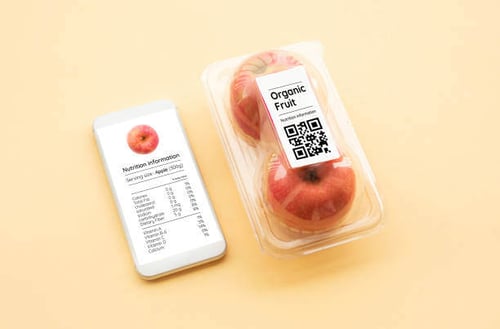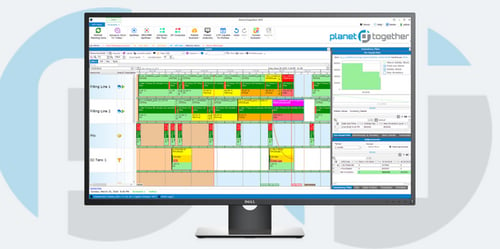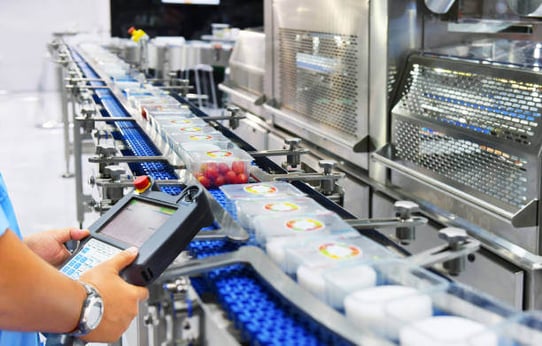Smart Packaging Solutions: How Manufacturing IT Managers in Food & Beverage Can Leverage PlanetTogether Integration
The food and beverage industry is evolving rapidly, driven by shifting consumer demands, sustainability concerns, and the need for greater supply chain visibility. One of the most significant technological advancements in this space is smart packaging, which integrates digital technology with traditional packaging to improve traceability, enhance consumer engagement, and ensure product safety.
For Manufacturing IT Managers, implementing smart packaging solutions requires seamless integration with existing enterprise systems like SAP, Oracle, Microsoft, Kinaxis, or Aveva. Combining smart packaging with advanced planning and scheduling (APS) systems such as PlanetTogether can enhance operational efficiency, reduce waste, and ensure compliance with regulatory standards.
This blog explores how Manufacturing IT Managers in food and beverage manufacturing can successfully implement smart packaging solutions through PlanetTogether APS and enterprise system integrations.

What Is Smart Packaging?
Smart packaging refers to packaging solutions that incorporate sensors, RFID tags, QR codes, NFC chips, and IoT-enabled devices to improve tracking, quality control, and customer engagement. It falls into two primary categories:
Intelligent Packaging: Provides real-time data on food freshness, temperature, and quality through embedded sensors and digital indicators.
Active Packaging: Actively interacts with food products to extend shelf life, reduce waste, or provide additional functionality (e.g., moisture control, antimicrobial coatings).
Key benefits of smart packaging in food & beverage manufacturing:
Enhanced Traceability: Real-time monitoring of product location and condition.
Improved Product Safety: Detects contamination, spoilage, or tampering.
Sustainability: Reduces food waste by optimizing shelf life.
Consumer Engagement: QR codes and NFC chips allow customers to access product information, authenticity verification, and promotions.
However, implementing smart packaging at scale requires robust IT infrastructure, seamless ERP and APS integrations, and real-time analytics capabilities.

The Role of PlanetTogether APS in Smart Packaging Implementation
Integrating smart packaging into the food and beverage supply chain adds complexity, requiring synchronized scheduling, precise material planning, and real-time monitoring. This is where PlanetTogether APS plays a crucial role.
1. Smart Packaging Production Planning & Scheduling
Smart packaging requires specialized materials and additional production steps, such as embedding RFID chips or printing QR codes. Traditional ERP systems like SAP, Oracle, or Microsoft Dynamics alone may not provide the agility needed for real-time scheduling. PlanetTogether APS can bridge this gap by:
Optimizing production schedules for smart packaging lines.
Synchronizing material availability with packaging requirements.
Reducing bottlenecks and downtime in packaging processes.
For example, if a food manufacturer integrates PlanetTogether with SAP, they can automatically adjust production schedules based on demand forecasts and real-time order changes, ensuring smart packaging is applied efficiently without disrupting production lines.
2. Ensuring Regulatory Compliance and Quality Assurance
The food industry is heavily regulated, requiring real-time documentation and compliance tracking. Smart packaging sensor data (e.g., temperature monitoring, spoilage indicators) must integrate with existing systems to ensure compliance with FDA, FSMA, and HACCP standards.
By integrating PlanetTogether APS with Aveva or Kinaxis, manufacturers can:
Automate compliance tracking with real-time packaging data.
Reduce risk of recalls by detecting temperature deviations or tampering.
Generate real-time reports for audits and supply chain transparency.
3. Optimizing Supply Chain Visibility & Inventory Management
Smart packaging requires advanced inventory tracking since RFID or barcode-enabled packaging provides real-time stock levels. Without an integrated system, food manufacturers may struggle with inefficiencies such as overproduction or stockouts.
How PlanetTogether + ERP integration optimizes inventory:
With Oracle integration, manufacturers can automatically update inventory levels based on real-time scanning of smart-packaged products.
With Microsoft Dynamics integration, planners can dynamically adjust packaging schedules based on supply chain disruptions or demand shifts.
With Kinaxis integration, manufacturers can forecast material needs and reduce packaging waste.
4. Reducing Waste and Supporting Sustainability Goals
Sustainability is a major focus in the food industry, and smart packaging can play a critical role in reducing waste. However, poor scheduling and inefficient supply chain management can offset these benefits.
PlanetTogether APS helps manufacturers optimize packaging usage by:
Reducing overproduction of packaging materials.
Minimizing excess inventory, which may lead to waste.
Aligning production schedules with sustainable sourcing.
For instance, if a company integrates PlanetTogether with SAP, it can use predictive analytics to adjust packaging production schedules based on demand trends, avoiding unnecessary material waste.
Overcoming Challenges in Smart Packaging Implementation
While smart packaging offers numerous benefits, Manufacturing IT Managers must address several challenges to ensure a smooth implementation:
Data Integration Complexity: Ensuring real-time data exchange between smart packaging systems, ERP platforms, and APS solutions.
Cost Management: Balancing the cost of smart packaging technologies with operational efficiency improvements.
Cybersecurity Risks: Protecting packaging data from breaches, especially when using IoT-enabled devices.
Change Management: Training staff and ensuring adoption of new packaging technologies.
For Manufacturing IT Managers in food and beverage facilities, smart packaging presents an opportunity to drive efficiency, improve compliance, and enhance customer engagement. However, successful implementation depends on seamless integration with enterprise planning systems.
By leveraging PlanetTogether APS alongside SAP, Oracle, Microsoft, Kinaxis, or Aveva, manufacturers can:
Optimize packaging production scheduling.
Enhance real-time inventory visibility.
Ensure regulatory compliance with automated tracking.
Reduce waste and support sustainability initiatives.
The future of food and beverage manufacturing lies in the convergence of digital technologies, and smart packaging is a key component. With the right integration strategy, Manufacturing IT Managers can ensure that their facilities remain competitive, efficient, and ready for the next generation of packaging innovation.
Are you ready to take your manufacturing operations to the next level? Contact us today to learn more about how PlanetTogether can help you achieve your goals and drive success in your industry.
Topics: PlanetTogether Software, Integrating PlanetTogether, Quality Assurance, Food and Beverage Manufacturing, Ensuring Regulatory Compliance, Smart Packaging Production, Optimizing Supply Chain Visibility, Reducing Waste and Supporting Sustainability Goals





















LEAVE A COMMENT